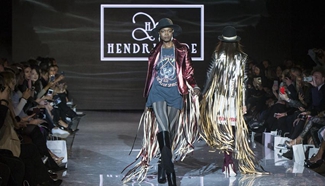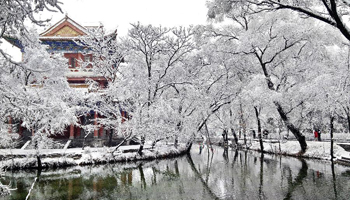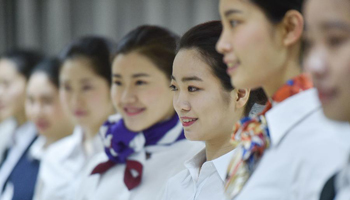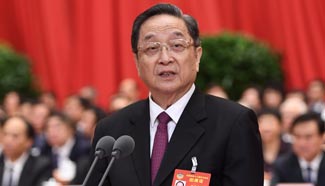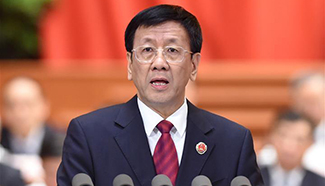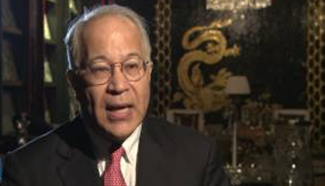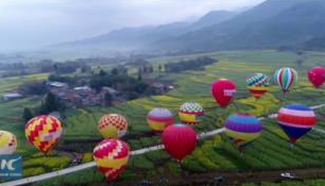by Burak Akinci
ANKARA, March 14 (Xinhua) -- Turkish president Recep Tayyip Erdogan had a one-day visit on Friday in Moscow where he met his Russian counterpart Vladimir Putin. Both leaders announced that they were ready to strengthen ties in several fields and to overcome rifts but they still remain very divided on the most acute crisis in the middle east, Syria, according to local experts.
During a press conference after the meeting, Vladimir Putin said "we had a very trustful, very effective dialogue," while in turn, the Turkish leader expressed faith in continuing Turkish-Russian cooperation.
"As far as security matters in our region are concerned, I believe that it takes joint efforts to end bloodshed in Syria," said Erdogan.
The road to this point was long as the two leaders clashed repeatedly over the Syrian conflict and their different views on the fate of Moscow's ally, Syrian leader Bashar al-Assad.
First, there was the downing of a Russian jet by Turkey in November 2015 amid Moscow's intervention into Syria, a neighbour of NATO member Turkey.
Putin imposed travel and trade sanctions on Turkey in response. A failed coup in June 2016, however, changed things dramatically. The Russian leader expressed solidarity towards the Turkish regime. Following an apology by Erdogan over the jet incident, things seemed to go back on track.
"Actually only a small portion of the punitive Russian restrictions have been lifted. They are still out there," Deniz Zeyrek, a political commentator and journalist, told Xinhua.
Hundreds of thousands Russian tourists, a major income for the tourism sector, banned from coming to the Turkish Riviera after the plane incident, have not yet returned, added Zeyrek.
As an example, the ban on the largest items such as fresh fruits, is still continuing.
Wanting to recover losses, Erdogan in this context said in Moscow, that Russia should swiftly lift all restrictions related to Turkish citizens and companies operating there.
Despite being at odds on the Syrian conflict, Moscow and Ankara began coordinating some military actions in Syria, including against Islamic State (IS) and Syrian opposition fighters holed up in Aleppo.
Yet the Russian-Turkish relationship was put to the test again last December, when Russia's ambassador to Turkey was gunned down in public by a Turkish assassin, a police officer in plain clothes, who claimed he was avenging Russia's brutal air campaign in the Syrian war.
Both sides agreed that the tragic murder will not affect the improvement of their relations.
In an unprecedented move, the heads of the Russian, Turkish, and U.S. armed forces have met last week in southern Turkey in a bid to iron out tensions between rival factions against IS in Syria.
The meeting came amid tensions around the northern Syrian town of Manbij, where troops from all three countries are now involved in a standoff.
The Syrian Democratic Forces (SDF), a Kurdish-led alliance that is backed by the U.S.-led coalition against IS has also the support of some 500 U.S. special forces advisers.
But Turkey sees the People's Protection Units (YPG), the Syrian Kurdish group that dominates the SDF, as a branch of a domestic Kurdish insurgency it is battling at home and labels it as a terrorist group.
Ankara has launched last year its own operation to push both IS and Kurdish militia away from its border.
YPG now is considered by both Moscow and Washington as a reliable partner in the struggle against the IS, a position that puts Turkey in a difficult position.
"Turkey and Russia remain very divided on the future of Syria. Moscow wants Bashar al-Assad to stay and Ankara wants him gone," explains professor Togrul Ismayil from the Ankara-based University of Economics and Technology (TOBB).
YPG has an office since last year in Moscow and Turkey asked Moscow to shut it down with no results at all.
But despite differences, both countries have a lot to offer to each other.
"This cooperation will not shatter the basis of NATO. Turkey wants to be pragmatic and tries to get the support it needs in various fields such as its arm supplies," said professor Ismayil.
On his way back from Moscow, President Erdogan confirmed that talk are underway for the purchase of Russian made S-400 missiles for its program to build the country's first long-range air and anti-missile defence system, in what would be a snub to NATO.
"If we can not rely on NATO on this then we will off course take the necessary measures. Russia has made improvements on the price of the system. We aim to reach an agreement as soon as possible," Erdogan was quoted as saying to the Turkish press.
But this could be a way for the Turkish leader to admit that Turkey needs Russia more than Russia needs Turkey, argues Deniz Zeyrek.
On the economy front, several agreements have been signed during Erdogan's visit, the most prominent one being the establishment of a joint investment fund of one billion U.S. dollars between the two countries prompting warm reactions in the Turkish capital.
"The mature way that Russia and Turkey tackled the brutal murder of the ambassador (in Ankara) demonstrated that they both want increasing collaboration in every field possible and have established a diplomacy channel that can withstand crisis," said a Turkish diplomatic source to Xinhua, preferring to remain anonymous.




